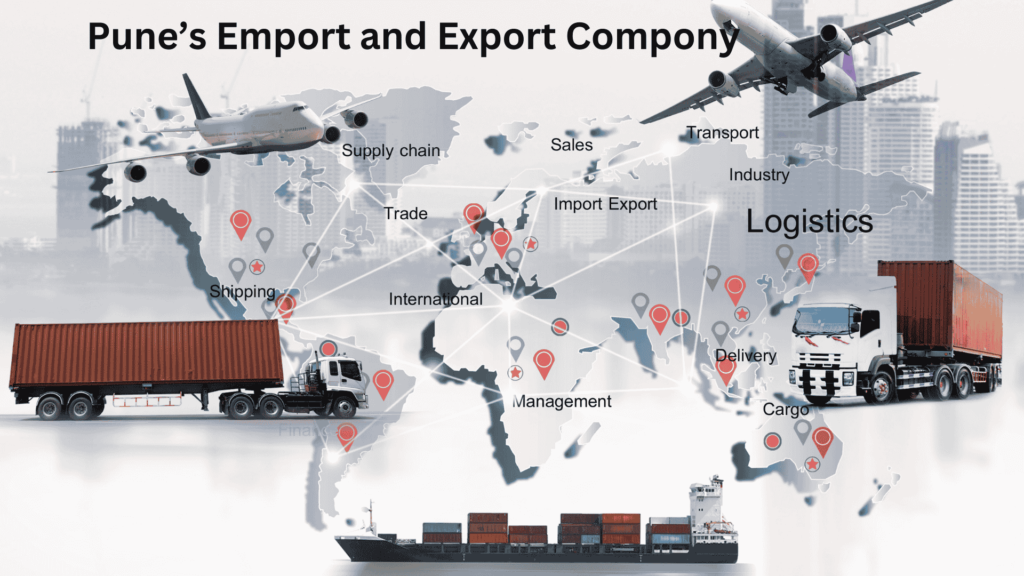Pune has emerged as a key hub for trade and commerce, with a thriving Pune’s import and export industry that contributes significantly to the economy. With its strategic location, well-connected infrastructure, and growing industrial base, Pune offers immense potential for businesses involved in global trade. However, like any industry, Pune’s import and export industry faces challenges alongside promising opportunities. By leveraging its strengths and adapting to market dynamics, businesses can harness the vast potential of Pune’s import and export industry to succeed in the competitive global market.
Opportunities in Pune's Import and Export Industry
Regulatory Compliance – One of the most pressing challenges for businesses in Pune’s import and export industry is the complexity of regulatory compliance. Companies are required to navigate a maze of customs duties, international trade policies, and various licensing requirements. Additionally, these regulations often change, making it difficult for businesses to remain consistently compliant. Staying abreast of new policies, especially those related to taxes, tariffs, and trade agreements, can prove to be an ongoing hurdle for many businesses. Non-compliance can result in delays, fines, and legal complications, which can significantly impact operations.
Logistics and Transportation – Efficient logistics and transportation are at the core of any successful import and export business. However, Pune’s import and export industry faces challenges related to transportation, particularly due to its distance from major seaports like Mumbai. While Pune is well-connected via highways and railways, the city is not located directly on the coast, which increases transit times. Delays in ports, limited warehousing space, and high transportation costs are additional logistical concerns that businesses must address. Improving supply chain management, optimizing routes, and investing in better infrastructure are crucial steps in overcoming these transportation challenges.
Currency Fluctuations – Currency exchange rate fluctuations pose another significant challenge for businesses in Pune’s import and export industry. These fluctuations can directly impact the profitability of international trade deals. A sudden drop in the value of the Indian rupee, for instance, can make exports more competitive, but it can also increase the cost of imports. Companies need to adopt effective risk management strategies, such as hedging, to mitigate losses from currency fluctuations. Developing strong relationships with banks and financial institutions that offer favorable exchange rates can also help manage this risk.
Competition from Global Markets – The global marketplace is increasingly competitive, and local businesses in Pune must constantly innovate to stay ahead of international competitors. As trade barriers continue to lower, Pune-based businesses are not only competing with domestic companies but also with suppliers from other countries. To maintain a competitive edge, businesses in Pune’s import and export industry must focus on product quality, efficiency, and customer service. Offering unique products, competitive pricing, and timely deliveries are critical for sustaining growth in this increasingly crowded space.
Technological Adaptation – As the global trade industry becomes more digitized, businesses in Pune must keep pace with technological advancements to stay competitive. The adoption of digital tools for transactions, inventory management, and real-time tracking is still in its early stages in the region. Companies that fail to integrate advanced technologies into their operations risk falling behind their competitors. Technologies like blockchain for secure transactions, artificial intelligence for predictive analytics, and automation for logistics management are all becoming integral to the success of businesses in the global trade sector. Adapting to these technological advancements is crucial for maintaining a competitive edge in Pune’s evolving import-export industry.
Opportunities in Pune’s Import and Export Industry
-
Government Initiatives – The Indian government has been actively supporting businesses through policies like ‘Make in India,’ which promotes manufacturing and export across the country. These initiatives aim to boost India’s trade relationships with other countries and facilitate ease of doing business. Additionally, the introduction of free trade agreements (FTAs) has expanded market access for Indian businesses, enabling Pune-based companies to explore new international markets. Export incentives, subsidies, and low-interest loans for small and medium enterprises (SMEs) are also helping businesses scale their global presence.
-
Rising Demand for Industrial Goods – Pune’s reputation as a manufacturing hub gives it a unique advantage in the global import-export industry. The city is home to several key sectors, including automobiles, IT hardware, pharmaceuticals, engineering goods, and more. This industrial base has led to a rise in the demand for products manufactured in Pune. With global manufacturers setting up operations in the region, Pune’s export capabilities are significantly strengthened. The city’s expertise in producing high-quality industrial goods opens up vast export opportunities for local companies.
-
Advancements in Digital Trade – The rise of e-commerce platforms and digital trade has revolutionized the way businesses operate internationally. Companies in Pune can now take advantage of online marketplaces, B2B platforms, and digital tools that facilitate smooth cross-border trade. E-commerce platforms like Amazon, eBay, and Alibaba offer Pune-based businesses an opportunity to sell products to international customers directly, bypassing traditional distribution channels. This has made international trade more accessible to smaller businesses and has expanded their potential markets.
-
Strategic Location – Pune’s strategic location near major ports like Mumbai offers significant advantages in the import and export sector. Despite being a landlocked city, Pune’s proximity to Mumbai (just around 150 km away) allows for easy access to one of India’s busiest ports. Additionally, Pune’s extensive highway, railway, and air connectivity make it an attractive location for businesses to establish operations. The city’s logistical advantages make it a prime location for businesses engaged in trade and international commerce..
-
Growing SME Sector – Small and medium enterprises (SMEs) in Pune are increasingly tapping into the global market. As these businesses expand their operations, they are creating new opportunities for international trade. The government’s support in the form of subsidies, low-interest loans, and export incentives is encouraging more SMEs to explore global markets. With lower production costs, innovative product offerings, and agile business models, Pune’s SMEs are positioning themselves as key players in the global export sector.
-
Diversification of Trade – Pune-based businesses are diversifying their export markets, moving beyond traditional trade destinations like the United States and Europe. Countries in Africa, Southeast Asia, and the Middle East are emerging as key trading partners. This diversification is helping businesses in Pune reduce dependency on specific markets and mitigate risks associated with economic downturns in certain regions. Additionally, expanding into these regions is opening new doors for trade opportunities, particularly in emerging markets.
-
Sustainability in Trade – The global demand for sustainable and eco-friendly products is on the rise, presenting new opportunities for Pune-based businesses. Companies adopting green manufacturing practices and eco-friendly products are gaining a competitive edge in international trade. Sustainability has become an important factor in global consumer preferences, and businesses that focus on environmentally responsible practices are likely to see increased demand for their products in foreign markets.


Future Trends in Pune's Import and Export Industry
Businesses in Pune’s import and export industry are increasingly using artificial intelligence (AI) and digital tools to streamline operations. AI-powered analytics are helping companies forecast demand, optimize supply chains, and improve decision-making. Automation in logistics and documentation processes is reducing trade barriers and increasing efficiency, which is vital for businesses in Pune’s import and export industry to stay competitive in the global market. The integration of digital technologies is also enabling businesses in Pune’s import and export industry to scale operations and reach new international markets more effectively.
Increased Foreign Investments
The Indian government’s push for foreign direct investment (FDI) in the manufacturing and export sectors is expected to boost Pune’s trade industry. With favorable policies and an attractive business environment, Pune-based businesses are likely to see increased foreign investments, which will enhance the city’s manufacturing capabilities and its export potential. This influx of capital is expected to further strengthen Pune’s import and export industry, providing local businesses with the resources needed to expand globally.
Growth of E-commerce Exports
E-commerce is set to play an even larger role in Pune’s export sector. With the rise of global e-commerce platforms, businesses in Pune’s import and export industry are increasingly tapping into international consumer markets, bypassing traditional distribution channels. This trend is expected to grow, particularly with the ongoing digitalization of trade processes. Online marketplaces and B2B platforms are creating new opportunities for Pune-based businesses to engage in cross-border trade with minimal overhead costs, further strengthening Pune’s import and export industry.
Sustainable and Ethical Trade Practices
Businesses in Pune’s import and export industry are also embracing sustainability and ethical sourcing practices. Meeting global sustainability standards and consumer demand for eco-friendly products is becoming a priority for many companies. By adopting these practices, businesses in Pune’s import and export industry can tap into the growing market for ethical and environmentally conscious products. As sustainability in trade continues to gain importance, green initiatives and eco-friendly product lines will further elevate Pune’s import and export industry as a leader in global trade.
Conclusion
Despite the challenges faced by Pune’s import and export industry, the opportunities for growth are abundant. With government support, advancements in technology, a growing SME sector, and a solid industrial base, Pune is poised to strengthen its position as a key global trade hub. By focusing on regulatory compliance, supply chain optimization, and embracing digital tools, businesses can thrive in Pune’s import and export industry and the global market. Pune’s import and export industry holds significant promise, and entrepreneurs looking to enter this space can take advantage of these opportunities to ensure long-term success.’
Table of Contents
Related Content-Dhandeep Trading Company

